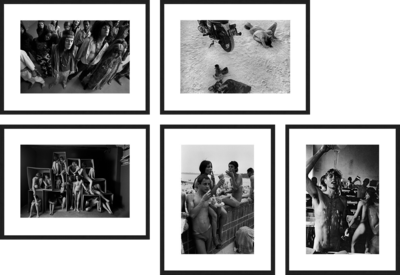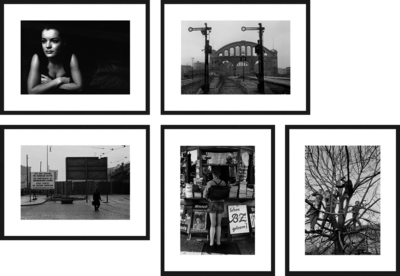Introduction
About the Work
Whenever we remember the 1960s, we are thinking, feeling, and seeing through the lens of photographer Will McBride, even if we don’t realise it. This internationally renowned artist’s work is closely connected to the politics, culture, and art of the post-war period in Germany. His powerful images have long been etched into the collective consciousness. McBride portrays the events and emotions between reconstruction and the student revolt of 1968 unlike anyone else.
While meandering through Berlin, through everyday life in a city in the process of rediscovering itself, McBride was able to capture the key historical moments – both large and small – of a divided nation. Full of passion and an adventurous spirit, the images reveal a Germany that appears to simultaneously fulfil and contradict contemporary clichés. With charisma and charm, the world famous artist depicts the zeitgeist and the discovery of a newly won freedom. McBride’s work offers a remarkable perspective and is one thing above all else: close-up. The feeling that the photographer belongs and the sense that he is a part of the surrounding events pull the viewer deep into the photographs.
About the Artist
After studying painting and art history in New York, Will McBride was posted to Germany as an officer in the army. In Berlin, he found what the U.S. only promised: a prevailing sense of optimism and big emotions, in which freedom and exuberance were palpable. After completing his military service, McBride chose to remain in West Berlin. Willy Fleckhaus – arguably Germany’s first Art Director – made McBride the head photographer for the highly acclaimed youth magazine, Twen. McBride’s work for the magazine brought him widespread attention.
In the year McBride began at Twen, the magazine published an image he took of his pregnant wife standing in profile with her trousers unbuttoned. The scandal it created continues to have an effect today. When Karl Lagerfeld photographed Claudia Shiffer in 2010 and Annie Leibovitz did her famous shoot with a very pregnant Demi Moore in 1991, they were making references to McBride’s iconic photograph. For McBride, the portrait of his wife was the beginning of his career. He ultimately became a legend in the history of photography through powerful portraits of Romy Schneider as well as his snapshots of John F. Kennedy, Willy Brandt, and Konrad Adenauer. In recognition of his life’s work, the internationally acclaimed photographer was awarded the Dr. Erich Salomon prize in 2004, joining the ranks of artists such as Robert Lebeck, Sebastiao Salgado, and Barbara Klemm.
Technique
McBride designs his images from his own experiences. During his time at Twen, the images reflected not only his professional development, but also his private live. Depictions of family, wives and sons are an on-going theme.
To find new, exciting and authentic subjects, McBride often spent days amongst strangers, took journeys into the unknown, and broke taboos – as with his shots of Commune 1. McBride became a documentarian of the sexual revolution, breaking down barriers – whether in the field of photography, sexual freedom, or in the distinction between work and play.
Hannah Hör
Bio
| 1931 | Born in St. Louis, Missouri, USA |
| 1950-1951 | Studied Painting at the National Academy of Design, New York City, USA |
| 1951-1953 | Studied Art History, Painting and Illustration at Syracuse University, New York, USA |
| 1953 | Relocated to Germany |
| 1959-2015 | Freelance photographer in Berlin and Munich |
| 1965 | Founded a photo studio in Munich |
| 2015 | Died in Berlin, Germany |
Awards
| 2004 | Dr. Erich Salomon Award, The German Photographic Association |
Collections
| Gunter Sachs Collection, Munich, Germany |
| DZ Bank Art Collection, Frankfurt, Germany |
| Museum DKM, Duisburg, Germany |
Exhibitions
Solo Exhibitions
| 2013 | Will McBride, Galerie argus fotokunst, Berlin, Germany |
| 2010 | Nude Visions – 150 Jahre Körperbilder in der Fotografie, Museum der Bildenden Künste, Leipzig, Germany |
| Zeitgeist Becomes Form, Australian Centre for Photography, Sydney, Australia |
| 2009 | Will McBride, Kunststiftung Poll, Berlin, Germany |
| 2007 | Will McBride – Eine Legende des Deutschen Fotojournalismus, Kunsthaus Kaufbeuren, Germany |
| 2005 | Große Lichtbildner des 20. Jahrhunderts: Will McBride, Kamera und Fotomuseum, Leipzig, Germany |
| 2001 | Sammlung Schupmann – Fotografie in Deutschland nach 1945, Museum für Photographie, Brunswick, Germany |
| 1996 | Das Deutsche Auge – Fotojournalismus in Deutschland, Deichtorhallen, Hamburg, Germany |






